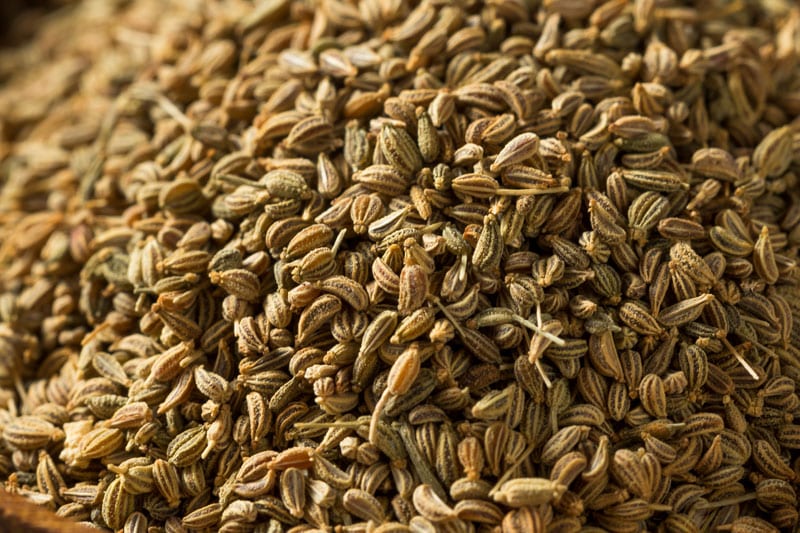
Ajwain, also known as carom, ajowan, omam, omum, ajvain or Bishop’s weed (depending on where in the world we’re talking) is a spice belonging to the Umbelliferae (or Apiaceae) family, some of whose other members are cumin, dill and caraway.
The ajwain plant’s shrubs appear feather-like, and the plant itself grows very quickly, reaching up to 3ft in height.
Both the seeds and leaves can be used for cooking, although the seeds are eaten more commonly. They are oval-shaped, striped and vary from slightly green/khaki to brown in colour, looking like a smaller version of cumin seeds to some.
I would guess that most of us haven’t heard of ajwain, considering it can be viewed as the little, less known brother of thyme and oregano. Both ajwain and thyme contain thymol, which gives the spices a similar and powerful scent, although ajwain is often described as having a stronger aroma.. The taste, however, is more comparable to oregano, due to its pungent first impression, sharp flavour and underlying bitterness. The aftertaste seems more sweet, reminiscent of anise.
Cooking with Ajwain
If you want to add a kick to your dish, ajwain is the way to go! It goes well with a variety of foods, such as curries, lentil soups and root vegetables. It is most frequently used in pastries and bread such as parathas, a flatbread native to India. Very commonly, it is also found as an ingredient in tadkas (a mixture of spices that is cooked before being added to the dish in order to enhance their flavours). Due to its similarity to spices like thyme and oregano, it can be used in a lot of the same ways.
Ajwain’s bitter and pungent taste is very unique but can also be very overpowering. It will definitely retain its own distinctive note when added with other spices. That said, it should be used sparingly, since its dominance can subdue the flavour of other ingredients. Hence, when cooking with it, it should be added little by little in order to maintain a balance. Cooking the seeds for a while mellows out the bitterness and increases the milder aftertaste.
Other benefits of Ajwain
Apart from enhancing the taste of various kinds of dishes, ajwain is used for numerous other purposes. The spice can be found in toothpaste and perfumes, and mixed with mustard oil, it acts as a powerful mosquito repellent. In India, the raw seeds are often chewed as a mouth freshener.
Hardly any other spice can boast with as many health and cosmetic benefits as ajwain. It has had a place in the Indian herbal medicine practice (Ayurveda) since ancient times.
Its high thymol content, which acts as powerful fungicide and germicide, is said to have a hand in lowering blood pressure, and made into an essential oil, ajwain can relieve tooth, ear and rheumatic pain if applied to affected areas. The spice helps with digestion, colds, diarrhea, asthma and even aids with symptoms of arthritis. In addition, ajwain helps with irregular menstrual cycles and excessive bleeding, and was used as an antiseptic in surgery a long time ago – and can still be applied for the purpose of cleaning wounds and cuts.
In addition, it is argued that it could potentially support weight loss due to its role in accelerating bowel movement, and it is also used to relieve acidity. Based on its antioxidant and anti-inflammatory properties, it can help with lightening acne scars and preventing swelling and redness. Finally, ajwain can be used as an aphrodisiac.
Honestly, this leaves you wondering what this spice can’t do.
Where is Ajwain from?
The Ajwain plant’s heritage is disputed. Many believe that it originated in what is now Iran and Turkey and from there, has spread to other regions like India, the Middle East and North Africa, where it is commonly used today.
Where to buy Ajwain
Ajwain is most commonly sold in seed form, as powdering the spice diminishes its distinctive flavour. If you do require a powdered version, you would do well to grab a mortar and pestle and grind the seeds yourself.
You can find Ajwain in a variety of places – it is sold in Indian and Asian grocery stores, as well as speciality spice stores and online. In the UK, there are also a few supermarket chains that carry Ajwain seeds, such as Tesco and Waitrose.
When buying Ajwain, you should make sure that the seeds are dark brown or green in colour and still retain a strong smell – if they have been sitting on a shelf for a long time, they have usually lost their fresh aroma, due to their essential oils evaporating quite quickly. Like other spices, they should be stored in airtight containers away from direct sunlight. If bought in plastic or paper packaging, they benefit from being transferred into a glass jar, since glass does not soak up flavour, as can be the case with plastic. If you follow all of those instructions, the spice should last you for at least a year, providing a fair bit of scope for experimental cooking experiences.
Conclusion
While ajwain has not yet been as successful in achieving the same “star quality” that other spices have, it adds a powerful and distinctive flavour to a variety of dishes and is therefore pretty fun to cook with. It might not yet be a staple on your spice rack, but once you try it, you’ll never want to miss it again.

